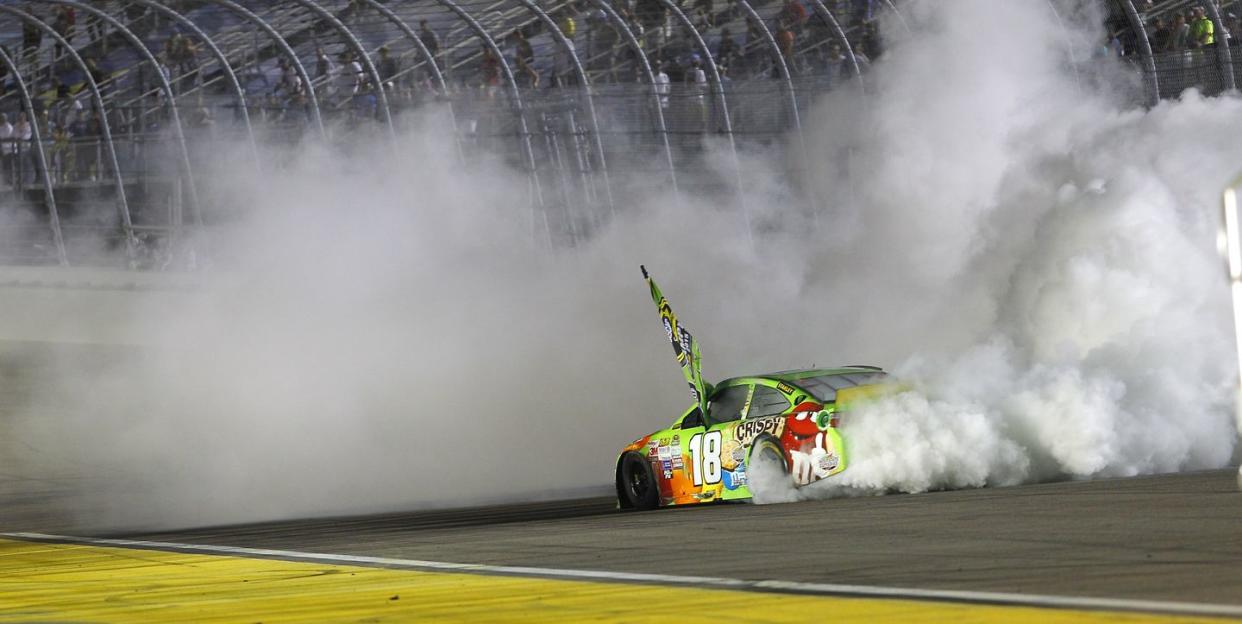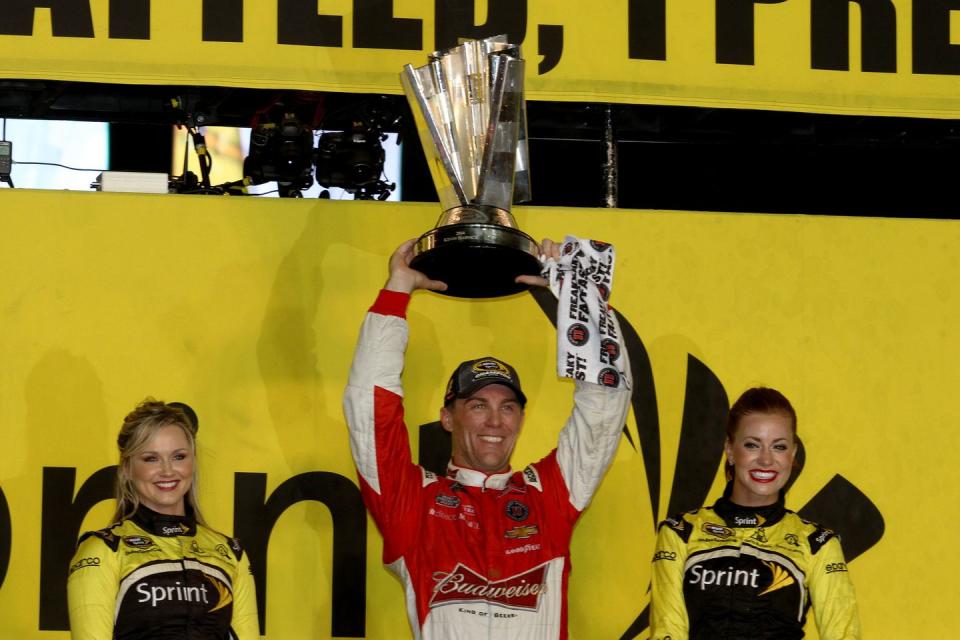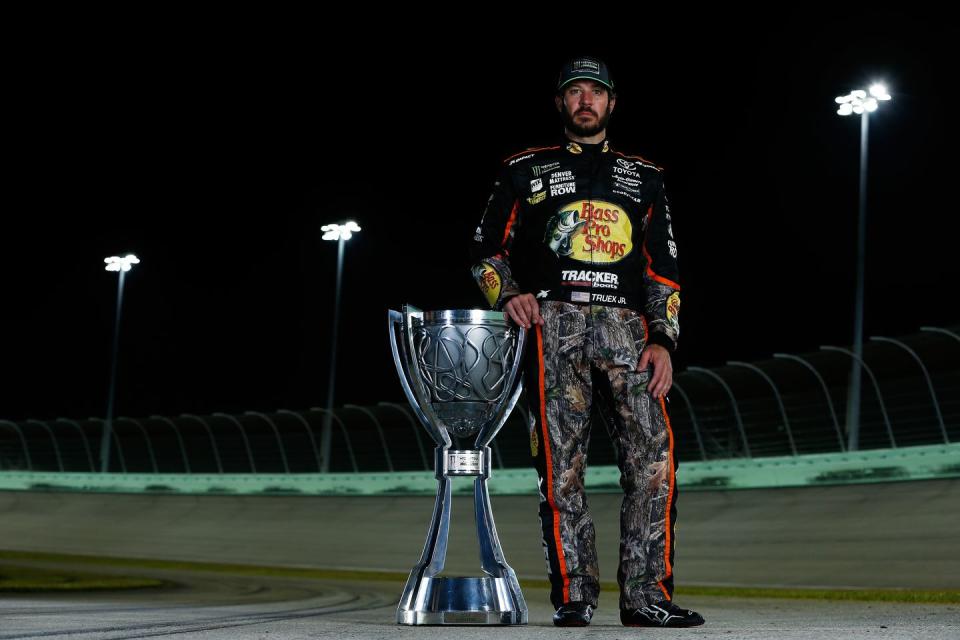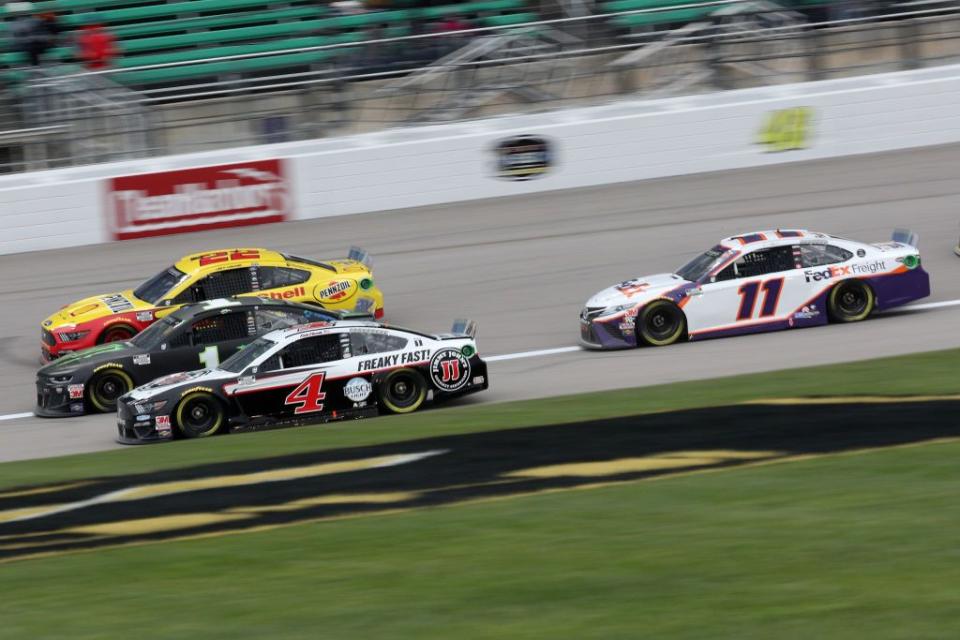Is NASCAR's Championship Format Working?

In January of 2014, NASCAR announced that it was abandoning its original Chase playoff format after a decade to build something completely different, a 16-driver, 10-race elimination format that ended with a guarantee of four cars with equal championship hopes racing in the finale with a shot at a title. The shift was radical, and many fans reacted with an immediate disgust. The new format was chaotic, designed explicitly to create absurd outcomes rather than reward the best drivers over the course of the season. What was once a way to avoid another Matt Kenseth situation had become about itself, a format that was willing to sacrifice the entire 26-race regular season for an all-or-nothing playoff that, at 16 cars, was practically guaranteed to include every real championship contender.
A few years later, the format was again shifted, with NASCAR's desire to add guaranteed restarts through "Stage" racing bringing with it a new format that also awarded "Playoff Points" that all but guaranteed the elite drivers of the regular season would advance to the Round of Eight, and generally seems to give the best driver of the season a near-guaranteed path into the Championship Four.
Seven years after the initial change and four years into the Stage Racing/Playoff Point variant introduced in 2017, we now have a fairly sizable sample of what NASCAR racing looks like in this brave new world. Finally, we can ask if this thing has worked.
What follows are each year's actual Championship Four, actual champion, and expected championship contenders under a traditional, non-playoff format. The test here is not whether or not the Playoff made a difference (It's supposed to make a difference!) but if it accurately rewarded the drivers that most deserved a spot in the championship fight on virtue of their regular-season performance. A season that rewards the most dominant driver, like 2017's championship for Martin Truex Jr., is an obvious success, while one that ends with all expected contenders being bested at Homestead by a driver putting together a more middling season, like 2018's title for Joey Logano, is seen as a unique failure created by the system.
Expected contenders are defined as those leading the points at the end of the season, those within one race of points at the end of the season, and those who recorded the most wins of the season but finished outside of that group.

2014
Actual champion: Kevin Harvick
Actual Championship Four: Kevin Harvick, Ryan Newman, Denny Hamlin, Joey Logano
Expected contenders without a playoff (points via Jayski): Jeff Gordon, Joey Logano, Brad Keselowski
The 2014 season was very close to ending very differently. Ryan Newman, who did not win a race at any point in the season, came into the final elimination round at Phoenix with a shot at sneaking into the Championship Four. Late in the race, he found himself next to Kyle Larson with an opportunity to simply bowl Larson out of the way and narrowly make the field over Jeff Gordon, who had finished second in two of three races in that Round of Eight and would have comfortably led the field by points in a non-playoff format, and Brad Keselowski, who had the most race wins on the season. Newman made the field, Gordon and Keselowski did not, and Kevin Harvick and Joey Logano's strong seasons became championship-level when two of the top three contenders in the series simply missed the final round.
Newman then finished second in the actual race, giving Harvick real troubles and coming very close to fulfilling NASCAR's doomsday scenario of a one-win champion in the first year of the format.
Harvick, who would have finished fifth in a non-playoff championship format, was a fairly worthy champion, with five wins on the season and wins in each of the last two races, by far the two most important on the schedule in this championship format. This goes down as an all-around memorable Playoff run, similar to Stewart-Haas Racing's other title in the 2011 Chase that saw Tony Stewart win his title by winning five of ten races in an otherwise-poor season.
2015
Actual champion: Kyle Busch
Actual Championship Four: Kyle Busch, Kevin Harvick, Jeff Gordon, Martin Truex Jr.
Expected contenders without a playoff (points via Jayski): Kevin Harvick, Joey Logano
More than any other season, this is the result that would have been impossible without a playoff.
Kyle Busch missed a third of his 2015 season, knocked out with a leg injury sustained in an Xfinity Series race the day before the Daytona 500. He returned at Charlotte in a truly massive hole, understanding that he would have to both win a race and climb back into the top thirty in points to make the playoff at all. He went on to record a memorable stretch of four wins in five races to secure his spot in the playoff. His actual playoff run, however, was far less memorable.
Busch went winless in the first nine races of the playoff, but secured his spot in the Championship Four by virtue of three top fives in the final three races. He then outran Kevin Harvick, who had led the season's championship standings for the vast majority of the year, at Homestead to grab the title. Both Harvick and Logano put up championship-caliber seasons, but Busch's title win was a unique feature of this format. Busch came perilously close to missing the top thirty in the regular season, but he missed just enough races that he could overcome it, and the title was his.
Whether or not this is a failure of the format is a more personal question than most years, one that requires you to weigh whether or not an injured driver should be able to win a title in a season that they did not actually complete. Personally, I consider this to be a rare strength of the otherwise-strange format. The season did feature an overwhelming failure, however; Joey Logano, who recorded three consecutive playoff wins and would have finished just 22 points behind Harvick on the season under a normal format, missed the race. Simply, this happened because Logano wrecked Kenseth from the lead at Martinsville in the first race of the Round of Eight, a result that would not have been season-ending under any other format, either before this or after this.
2016
Actual champion: Jimmie Johnson
Actual Championship Four: Jimmie Johnson, Joey Logano, Kyle Busch, Carl Edwards
Expected contenders without a playoff (points via Jayski): Kevin Harvick, Joey Logano, Jimmie Johnson
Harvick's 2014 title feels completely non-controversial in no small part because he put together two championship-level seasons immediately afterward. His early elimination in 2016 was one of the more egregious results in Chase history, however, as he was eliminated in the Round of Eight despite posting finishes of 20th, 6th, and 4th over the three races. A win by Carl Edwards, who finished 36th and 19th in his other two races in the round, all but guaranteed his elimination before the final race of the Round of Eight, leaving the door open for a battle between Johnson, who had won the most races on the season, and Logano, the second strongest driver by points behind Harvick. Johnson won the race, and, with it, his seventh title.
This was the final season of the truly wild unseeded elimination format. Playoff Points introduced in 2017 meant that each elimination round, including the all-important Round of Eight, would now reset to include a baked-in reward for drivers who had been successful throughout the year, a system that effectively was put into place to prevent results like Harvick's miss in 2016.

2017
Actual champion: Martin Truex Jr.
Actual Championship Four: Martin Truex Jr., Kyle Busch, Kevin Harvick, Brad Keselowski
Expected contenders without a playoff (points via RacingNews): Martin Truex Jr.
The first year of the Playoff Point format was, by far, the most representative Championship Four and final result of any season in the elimination era. Truex, who had the most wins on the season and would have scored by far the most points under a non-playoff, non-stage point format, won Homestead as part of a startling playoff performance that saw him finish out of the top five just once in the final ten races, and was able to grab his title over a playoff field that also included Busch, Harvick, and Keselowski, who join Truex to make up four of the five dominant drivers of this era.
Truex was not only the only driver to put up a championship-level season in 2017, he was the one who put up a season to remember. Any result but a title for Truex in 2017 would have been a shame. The team's performance at Homestead ensured that such a shame would not come to be.
2018
Actual champion: Joey Logano
Actual Championship Four: Joey Logano, Martin Truex Jr., Kevin Harvick, Kyle Busch
Expected contenders without a playoff (Points via RacingNews): Kyle Busch, Kevin Harvick
2018 was the year of the "Big 3," the grouping of Truex, Harvick, and Busch that was clearly dominant in just about every race run that season. Those drivers together tallied 20 of 36 possible wins, seemed to be eternal fixtures in the top five of any race at any track, and grabbed three of the top four spots at Homestead.
Unfortunately for NASCAR, Joey Logano finished ahead of all of them.
Mind you, Logano did not have a poor season by any means. He won three races and would have finished fourth in a more traditional championship format, an impressive stretch even if it was only his third-best season of the decade. Effectively, this was not a title Logano should have won, but Logano should have won a title during the elimination era.
This is the only argument I can offer to justify a format that allows a field with so many clear contenders to be beaten to a championship by their distant rival.
2019
Actual champion: Kyle Busch
Actual Championship Four: Kyle Busch, Martin Truex Jr., Kevin Harvick, Denny Hamlin
Expected contenders without a playoff (points via RacingNews): Kevin Harvick, Joey Logano, Kyle Busch, Martin Truex Jr. Denny Hamlin
Without a playoff, five drivers could have come into Homestead with a shot at a title. Four of those drivers were in the Championship Four, so the result is fairly hard to argue against here. Logano was knocked out of the Championship Four despite finishes of 8th, 4th, and 9th in the Round of Eight because Denny Hamlin won a race in the round, but both drivers certainly belonged at Homestead. Busch won the title over Truex by virtue of his win at Homestead, marking a fairly successful year in the format

2020
Incomplete. The season has two races remaining, with Joey Logano officially locked into the Championship Four after winning at Kansas two weekends ago and Kevin Harvick in a great position to advance after tomorrow's race at Martinsville with his 42 point lead on the cutoff line.
This championship format borders on absurd, but it has not done a terrible job of actually naming champions. NASCAR should be thankful it avoided a title for Newman in 2014, because every result that actually happened is at least a title for a driver that had a championship-level season at some point in the years between 2014 and 2020. This is the argument in defense of the format, that, even when it produces fluke winners, it requires those fluke winners to run through so many hoops that they are all but guaranteed to already be a championship-level driver racing for a championship-level organization.
The bigger concern for NASCAR is that this format, in either of its forms, has yet to actually create any new buzz outside of the world of racing for the sport. Fans of other sports are not flocking to NASCAR because of the format, and those who do come for other reasons may instead find themselves confused by the labyrinth of stage points, playoff cutoff rounds, and lap leading bonuses that actually set the field for the final race. The winner-take-all format in that finale is at least satisfying, and has so far ended every single season with the winner of the final race also taking home the season championship.
Over six completed seasons, this format has crowned Kevin Harvick, Kyle Busch, Jimmie Johnson, Martin Truex Jr., Joey Logano, and Kyle Busch again. Whether or not those drivers deserved their titles in those particular seasons, anyone who has watched NASCAR closely over the past seven years would tell you that those are championship-level drivers. Both Brad Keselowski and Denny Hamlin, currently third and fourth in the Cup Series standings, will have a chance this weekend to ensure that they have their one-in-four shot next weekend to join that group. They have been championship-level drivers over this stretch as well.
Does the series have something to be proud of here? Probably not. But the championship format itself is not a travesty, and the worst fears of those fans back in 2014 have yet to be realized. It may be disappointing, but my conclusion from the first seven years of this format is that it is not good, but it is fine. This was surely not the result the people behind the format were looking for, but it is certainly a better result than I actually expected when the format was announced.
...Congratulations?
You Might Also Like

